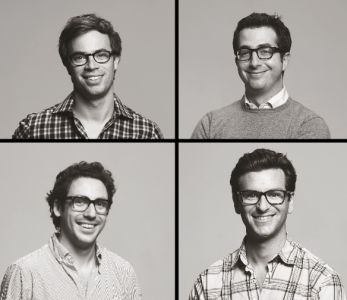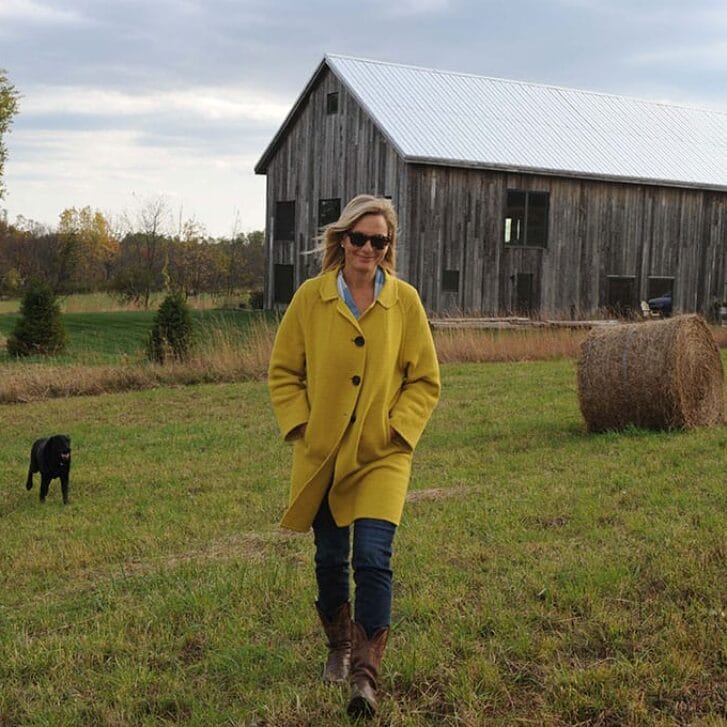Neil Blumenthal, WG’10, stood at the front of the Ambani Auditorium in Huntsman Hall in a casual stance that made it nearly impossible to distinguish him from the students filling the auditorium. Despite his laid back demeanor, the crowd quickly silenced as he approached the podium. The success of Warby Parker is legendary among students and the audience anxiously waited to hear the story directly from one of the co-founders.
Prior to coming to Wharton, Neil worked in public policy and became disheartened as his visions of change got lost in layers of bureaucracy. Determined to make more of a direct impact, Neil worked at VisionSpring, a non-profit company aimed at serving the 1 billion people worldwide who are without glasses. With the purchase of prescription eyewear, underserved consumers were empowered with as much as a 20 percent increase in income.
Neil’s experiences there stuck with him as he started his MBA program at Wharton and met Jeff Raider, Dave Gilboa and Andy Hunt, (all WG’10s) three other first-year students. How could prescription eyewear, something that enabled a sense as essential as vision, cost over $700? The four co-founders of Warby Parker knew this was their way to make a direct impact on the lives of others.
By “leveraging the University to the till,” Neil, Jeff, Dave and Andy were able to develop a game changing business with only $120,000. Countless surveys of Wharton classmates helped the team hone in on the top three priorities for the brand: first, as a fashion brand; second, offering value and service; and third, having a social mission. In their initial business plan, they wanted to price their glasses at $45 per pair, but helpful advice from Jagmohan Raju, the Joseph J. Aresty Professor the Marketing Department, changed their minds. As Professor Raju anticipated, their cost of goods doubled, making the $45 price completely impossible.
Through market research, they were able to determine that $100 was the point at which people thought the product was not too expensive, but was still made with quality. The Warby Parker team reached out to classmates and faculty to lend their expertise as they continued finalizing their business concept. They also took advantage of programs and centers within the University, such as the Jay H. Baker Retailing Center and Wharton Entrepreneurship. The Wharton Venture Initiation Program (VIP) offered them a platform to engage with other student entrepreneurs and the Wharton Venture Award (WVA) helped fund the team one summer, enabling them to focus on Warby Parker full time.
By February of 2010, they were ready to launch and within four weeks of opening, Warby Parker had a waitlist of 20,000 people. Success continued as savvy marketing built into the product, such as the “try five” concept, lead to a networking effect and brought more customers to the site. Today over half of their sales are driven by word of mouth. Their explosive growth was not without its hiccups, like when they had to negotiate with 14 different banks before they were able to secure a loan to finance expansion. Through the online store, popup shops, the Warby bus and a new flagship store, the brand continues to grow despite any obstacles. The reason? They have a strong sense of who they are as a company. With every decision they make, the key stakeholders, from customers to investors, are in the front of their minds and they have an open environment that allows for honest reviews and learning opportunities to improve.
They also stay true to their social mission by making monthly donations to vision charities and ensuring their company operates at 100 percent carbon neutral. As a brand, self-imposed constraints allow for greater creativity within their literary aesthetic. This is evident from their unique launch show at the New York Public Library to the new brick-and-mortar store inspired by great libraries, which saw over 4,000 customers during its opening weekend. As Neil said, “Customers can sense authenticity,” setting Warby Parker leagues above its competition.
Three years after launch, Neil, Jeff, Dave and Andy have not let their success tear them apart and continue to be friends. Conscious decisions made early on, such as dividing the company equally, helped to ensure their continued friendship. Knowing all four co-founders may not stay with the company indefinitely, they created a monthly vesting schedule to allow an escape valve for anyone who wanted out. They also met regularly at Roosevelt’s, the bar where the idea for Warby Parker was born, to openly discuss any frustrations they had.
Neil stated, “You are the biggest impact to your success,” and their willful decision to not let relationships be sidetracked by the business ensured their success. From the way they operate as a team to their commitment to making eyewear affordable for consumers everywhere, Warby Parker proves a successful company can do good things for the world.
Editor’s note: This post first appeared on Wharton’s Entrepreneurship Blog on May 2, 2013.

























